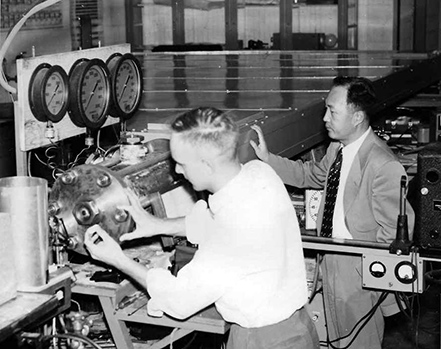
In 1997, Eugene Ch’en was combing through the files of his deceased father, Shang-Yi Ch’en (PhD ’40), when he came across a stack of letters. The typed notes—formal and concise yet imbued with sincerity—were addressed to his father and sent by Robert A. Millikan, co-founder of Caltech and a 1923 Nobel laureate.
“I am delighted that you are keeping on with your publishing since your doctorate,” Millikan wrote. When he sent that letter in 1944, Millikan had not seen his protégé in five years. Due to escalating Japanese aggression in China, the elder Ch’en had returned to China after completing his final examinations. Compelled to be close to his family during these tensions, he would not attend Caltech’s commencement ceremony and would miss the opportunity to be recognized among his peers for attaining cum laude honors. Soon, World War II would begin, and after the attack on Pearl Harbor, invading forces would shutter Yenching University where Ch’en conducted his research.
As the letter indicates, the Caltech-trained scientist still found a way to continue his investigations.
After the war, Ch’en joined the physics faculty at the University of Oregon and pursued research in optical spectroscopy. In 1952, Millikan wrote that he would endorse Ch’en’s work: “Be assured that I shall reply favorably to any inquiries that come to me from the National Science Foundation with respect to your capacity for contributing in the field indicated in your letter.”
For Eugene Ch’en, the correspondence offered a glimpse of his father as a young physicist during a dramatic time in the 20th century.
“When he came to Caltech, it was really, truly a foreign environment for him,” he says. “There was nobody he knew here. He had very limited resources, and I think what he accomplished with so little is especially admirable.”
As the senior Ch’en adjusted to his adopted country, he had a friend in Millikan, who would speak with him whenever there was a gathering of graduate students. These friendly conversations evolved into a lasting friendship as the two corresponded, and led to a visit from Millikan at the Ch’en family home in Oregon.
The younger Ch’en knew that his father had mentioned giving back to Caltech but was unable to do so before his death. When the time came for Eugene Ch’en to begin planning his own estate, he thought of his father, the letters, and Millikan.
Eugene Ch’en established the Shang-Yi Ch’en Professorship in Physics, an endowment that honors his father and intertwines the legacies of the Ch’ens with Caltech. The gift of a professorship offers generations of scholars the assurance of consistent support, enabling them to dream bigger when imagining new research ideas. Additionally, because they free up Institute resources for other purposes, professorships remain one of the Institute’s highest priorities.
After thoughtful discussions with Caltech’s Offi ce of Gift Planning, Eugene Ch’en transferred some of his rental property to Caltech and created a flip charitable remainder unitrust. With this arrangement, he will receive net income generated from the trust until the property is sold, or at another agreed-upon date. Then, the financial arrangement flips to a traditional charitable remainder unitrust, with Eugene Ch’en receiving a fixed percentage of the trust value annually. At the end of the trust term, the remaining funds will support the Ch’en professorship and Caltech. This type of unitrust is ideal for people who would like to contribute assets—such as real estate—that take time to liquidate.
The endowed gift may not be Eugene Ch’en’s final contribution to Caltech. To build on the rich history of the Ch’en Professorship, he is considering donating his father’s cherished letters to the Caltech Archives.


